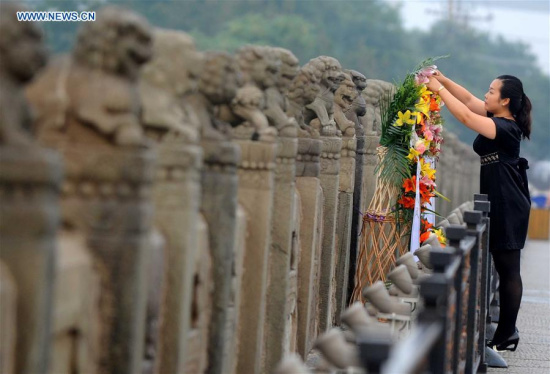
A member of the Communist Party of China arranges a flower basket at Lugou Bridge in Beijing, capital of China, July 7, 2013. (Xinhua)
Friday marks the 80th anniversary of the "July 7 Incident" that triggered Japan's full-scale invasion of China in 1937, compelling the Chinese people over the next eight years to fight back while enduring tremendous suffering and sacrifice.
Eighty years later, few eyewitnesses to the Japanese onslaught remain, yet they remind the Chinese and all peace-loving people not to forget the historic event as memories fade.
Such remembrance should not merely be a bitter recollection of a past tragedy, but also galvanize us to guard against ongoing revisionist sentiments among Japan's right-wing, who also commemorate the incident but with a shameful twist: one that whitewashes the perpetrators' war crimes.
The Marco Polo Bridge Incident, in which the Japanese army absurdly demanded to search for what they claimed was a missing soldier in the town of Wanping near Beijing, sparked Japan's full scale invasion of China, impacting the trajectory of modern Chinese history.
The incident marked the start of China's full-scale War of Resistance against Japanese Aggression, despite the fact that Japan occupied Northeast China -- then commonly referred to as Manchuria -- by force as early as 1931 and colonized the resource-rich region with utter brutality under the puppet "Manchukuo" regime for 14 years until its defeat.
The Chinese government, in tribute to the sacrifice made by those fighting against Japanese invaders before 1937, decided in January to rewrite history textbooks and extend the start of the war back to 1931.
Commenting on China's decision, Yasuhisa Kawamura, then press secretary of the Japanese ministry of foreign affairs, said China did not have the power to decide when the conflict started, while urging the two countries not to "focus excessively on the unfortunate past."
By frivolously describing the profound suffering that Japanese militarism brought to China and other Asian countries as "unfortunate," these official comments roundly show how reluctant and insincere Tokyo is in facing its war crimes.
Ever since Japan unconditionally surrendered to the Allied Forces in August 1945, war-obsessed right-wing groups have engaged in justifying the country's heinous war deeds. The fact that such efforts show no signs of abating soundly refutes Kawamura's assertion that China excessively focuses on the past.
In total disregard for historical facts, the Japanese right continues to distort what happened during the Marco Polo Bridge Incident by claiming that China fired the first shot, thereby blaming the country for the expansion of the war.
China wasn't the only victim of Japanese aggression.
The Japanese militarists viewed the peoples of neighboring countries as belonging to "inferior nations." Japan justified its subsequent colonization and invasion of the Asia-Pacific as a means to help its Asian neighbors establish civilized countries on the sophistry that they were unable to do so themselves.
The Japanese right today has been working feverishly to alter the past, claiming Japan's hegemony in Asia was justified on the grounds of liberating Asian countries from Western colonial rule.
Japan's aim is simple: to overturn the postwar international order as well as the sentences handed to Japanese war criminals by the International Military Tribunal for the Far East.
China today is no longer as weak and vulnerable as it was 80 years ago, but the adversarial attitude of Japan's right-wing toward China remains largely unchanged.
Prime Minister Shinzo Abe's relentless pursuit to revise Japan's pacifist Constitution is gaining ground. It won't be long before Japan's so-called "self-defense forces" are empowered to invade other countries.
Given what the country did 80 years ago, both China and the international community must not take the ascendancy of Japan's right-wing groups lightly lest the historical catastrophe of 1937 repeat itself.


















































